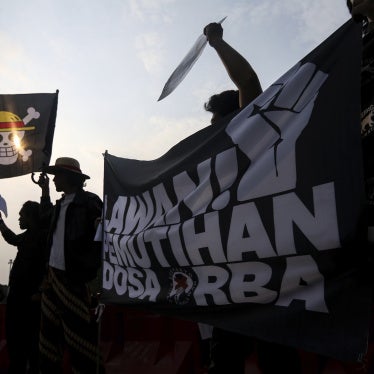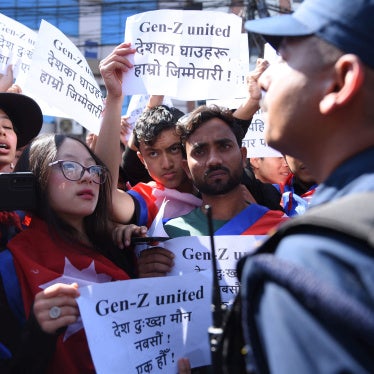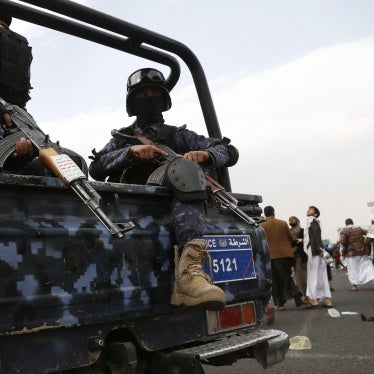WASHINGTON -- The rebuilding of a peaceful Afghanistan requires a commitment to protecting the human rights of all Afghan citizens, including women and ethnic minorities. The International Conference on Reconstruction Assistance to Afghanistan taking place in Tokyo should take action to support the institutions and programs needed to promote human rights and secure justice.
Japan has made valuable contributions to helping Afghanistan's war-ravaged population. Tokyo has given equipment and funds to remove land mines, provided assistance to refugees in camps in Pakistan and given humanitarian aid through Japanese nongovernmental organizations. As the host and cochair of the conference this week, the government of Prime Minister Junichiro Koizumi should now use its influence to ensure that human rights are integrated into the broader reconstruction agenda.
The Bonn agreement adopted Dec. 5 emphasized the central role of human rights in Afghanistan's future, as did a subsequent U.N. General Assembly resolution. The U.N. declared that "only a political settlement aimed at the establishment of a broad-based, gender-sensitive, multiethnic and fully representative government, which respects the human rights of all Afghans . . . can lead to durable peace and reconciliation."
But there's a risk that these concerns will be sidelined as the donors scramble to underwrite the new Afghan interim administration and quickly start up urgently needed aid projects. That would be a mistake. Without a functioning judiciary, and measures aimed at empowering Afghan women and supporting returning refugees, the new Afghanistan administration will face serious difficulties.
A key priority for the Tokyo conference should be a decision to supply the funding needed for the human rights components of the U.N. mission charged with supporting and coordinating the various aid efforts. Human rights shouldn't be an afterthought or an agenda item left for future aid conferences.
Afghanistan's legal system must be rebuilt --literally from the ground up. Courts, jails, and prisons must be reconstructed. In the early 1970s, there were legal codes, a system of district courts, and a law faculty at Kabul University. Resources will be needed for the recruitment and training of jurists, prosecutors, defense attorneys, police officers, and court officials. Special attention must be paid to recruiting Afghan women judges and lawyers. (The women's affairs ministry is in dire needs of funds; these should be specifically earmarked.)
As power shifts take place and as refugees and displaced persons return to their home villages, disputes over land and water resources are likely to increase.
Impartial arbitration mechanisms will be vital to address competing claims and to prevent renewed conflict along ethnic or sectarian lines. In addition, village justice systems have traditionally not been able to fairly address crimes against women. Donors should provide funding to reform the rural legal system.
The Bonn agreement called for the creation of an independent human rights commission by the new Afghan government. Clearly such a commission could play a useful role carrying out training, educational and monitoring activities. The agreement also affirmed the role of the U.N. in investigating past crimes and violations of human rights and international humanitarian law. The U.N. mission should be adequately funded to assist with both of these initiatives. Donors should earmark contributions for the new human rights commission, and for teams to work with Afghan civil society and the new government in drafting laws and a constitution.
A second priority topic for the Tokyo conference is the plight of millions of Afghan refugees in Pakistan, Iran and other neighboring countries. No one should be forced to return to Afghanistan, and voluntary repatriation should take place only with effective international monitoring and screening mechanisms in place, developed in cooperation with the U.N. High Commissioner for Refugees. Conditions remain dangerous and unstable in many areas.
But when refugees and displaced civilians do go home, they'll confront wrecked communities and problems resuming farming and getting adequate shelter for their families. Repatriation projects must be crafted with a special focus on the needs of women, illiterate and disabled returnees. Meanwhile, the Tokyo conference should encourage donors to maintain the assistance needed for refugees to remain safely in camps outside Afghanistan, protected from violence or any pressure to go back prematurely.
Finally, the donors should agree on an immediate infusion of funds for the emergency clearing of mines in areas where aid must be delivered. Quick funds are also needed for civilian mine awareness programs, and new training schemes for those doing the clearing. In addition to millions of land mines, the Afghan landscape is cluttered with unexploded American cluster bombs and other ordinance. Making the country safe from the litter of decades of war is a long-term objective, but the new Afghan government could show its determination to end the threat by deciding to accede to the 1997 Mine Ban Treaty.
The Tokyo conference marks a new beginning for the Afghan people, supported by the international community. Building the conditions for peace, and economic and social development requires a commitment to human rights principles -- and the institutions to promote and defend them.








